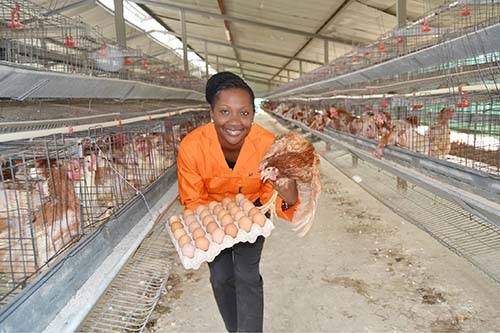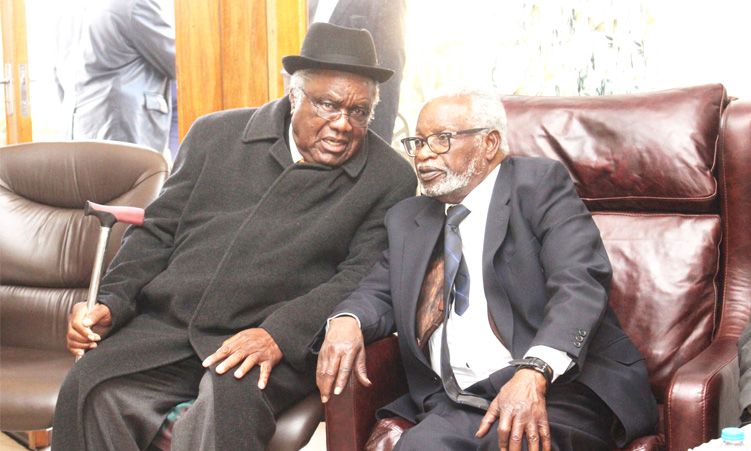YOUTHFUL businesswoman Twapewa Kadhikwa says she is a very persistent person as we sit down to discuss her latest business venture – Kadhikwa Live Chicken, situated in Windhoek’s Brakwater area.
“It’s only ten minutes’ drive from here (from our meeting point – Monte Christo Service Station),” she tells me. The farm off the BI road towards Okahandja is a small operation and sells both live and dressed chickens and vegetables.
Twapewa and her husband, Erastus, own the Xwama Cultural Village and Traditional Restaurant, famed for its traditionally prepared Namibian chicken.
Twapewa (35) who says entrepreneurship runs in her blood has been running businesses since she graduated from the University of Namibia over 10 years ago. She says she paid for her university education from her then hair salon business.
The cheerful and charismatic Twapewa, who is a mother of four children, insists that we focus the interview on her latest business venture – chickens and eggs.
With the recent re-capitalisation of Xwama, Twapewa and her husband did not hesitate when they were presented with an opportunity to buy the farm that produces a sizeable number of chickens and eggs.
At this stage, I ask Twapewa the definition of a ‘marathon or village’ chicken. Surely the pampered chickens in a coop on her farm do not qualify to be labelled ‘village or marathon chicken’.
Twapewa, who is fond of saying ‘let me give you a short lesson,’ then ‘educates’ me, saying that it was the breed, which made them ‘marathon’ chickens and not necessarily that they are free roaming and fending for themselves.
With chicken being the mainstay of Xwama, Twapewa says, the poultry farm which was the main supplier of chicken became an attraction to buy.
The chickens are transported from a satellite farm in Omaruru to the farm for meat and eggs.
Twapewa says Namibia consumes about 1,1 million eggs a month, but said less than half of the eggs are imported.
She is worried that cheap chicken imports from Brazil is negatively affecting local poultry firms. Priced as low as N$25, she says local producers cannot compete with Brazilian producers who have the means to produce chickens on a mass scale, some of which are ‘dumped’ on the local market.
“They are getting away with murder. I want to meet with the Agronomic Board, she says.
The farm is ideally situated in an area with a good climate for poultry farming and near a feedlot. It is also in close proximity to
the well-known poultry farm Waldschmidt Eggs, which was established in 1959.
“Eckard Waldschmidt is our mentor and has been very helpful. The farm is now run by the second generation of Waldschmidts. There is a perception that Germans do not want to work with other Namibians but Eckard has been helping us establish networks in the industry,”she says.
Using the Waldschmidt family as an example, Twapewa says she wants her business ventures to survive for generations, lamenting that most business enterprises owned by black Namibians collapse when their founders die.
Her other mentors are permanent secretary of the Ministry of Trade and Industry, Malan Lindeque, President-elect Hage Geingob, whom she said is ‘addicted to Xwama chicken,’ his wife Monica Geingos, whom Twapewa has known since her younger days growing up in Katutura.
Other mentors include Sakaria Nghikembua, managing director of Mutual and Federal Namibia, businesswoman, Kauna Ndilula and advertising executive, Abius Akwaake.
“I won’t take anti-depressants,” she quips, referring to the many people she can ask for direction.
She says she has six boxes of rejected proposals and 18 boxes of awards received over the years.”In the last 18 months, I have had 10 proposals rejected.”
Besides the chicken business, the farm grows vegetables, which are meant for Xwama and for sale.
Kadhikwa Live Chicken can be reached at 0811283630 or via email at Kadhikwa@gmail.com
Stay informed with The Namibian – your source for credible journalism. Get in-depth reporting and opinions for
only N$85 a month. Invest in journalism, invest in democracy –
Subscribe Now!










